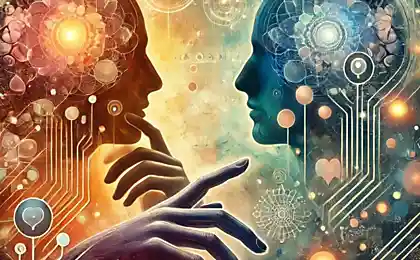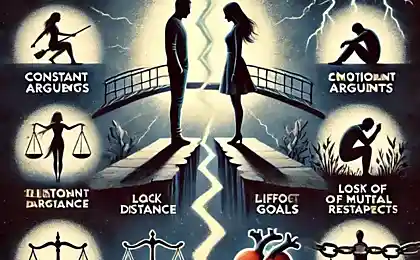9
9 Signs of Emotional Illiteracy That Ruin Your Relationship

In a world where technology advances at the speed of light, we often forget about the most important technology, the ability to understand and manage our emotions. Emotional literacy becomes not just a desirable skill, but a critical element of successful relationships. Studies show that 90% of failed relationships are due to emotional immaturity of partners.
Imagine a person who masterfully owns complex computer programs, but can not explain to his partner what is bothering him. Or someone who is able to solve multi-million dollar business problems, but falls into a stupor at the first conflict in a relationship. Does that sound absurd? Unfortunately, this is the reality of most modern couples.
The Anatomy of Emotional Catastrophe
Emotional illiteracy is not just a lack of knowledge about feelings. This is a systemic inability of a person to navigate in his own emotional world and the world of his partner. According to research by psychologist Daniel Goleman, the author of the concept of emotional intelligence, people with low EQ are 3 times more likely to face divorce or breakup of a long-term relationship.
Emotional illiteracy in a relationship is like trying to fly a blindfolded spacecraft — technically possible, but extremely dangerous for all flight participants.
1. Emotional muteness: when words lose meaning

Not being able to name your feelings is the first and most devastating sign of emotional illiteracy. When a person is unable to articulate clearly whether they are feeling sadness, irritation, anxiety or joy, they create an invisible but impenetrable wall between themselves and their partner.
Danger: The partner begins to feel excluded from your inner world, which leads to emotional distance and a gradual cooling of the relationship.
Practical recommendations:
- Keep an emotional diary, writing down 3-5 emotions daily
- Use the emotion wheel. Robert Doodler for Expanding the Emotional Vocabulary
- Practice the STOP technique: stop, take a breath, define the emotion, share with your partner
- Read fiction – it naturally develops emotional intelligence
2. Emotional Devaluation: The Killer of Intimacy
Phrases-killers of emotional intimacy are familiar to everyone: “Don’t take it personally”, “Calm down”, “It’s not worth your worries”. Behind the seeming care lies a deep disrespect for the emotional experience of the partner. A University of Washington study found that couples where one partner regularly devalues the other's emotions break up 87% of the time within five years.
Alternative approach: Instead of depreciating, use the emotional mirror technique – repeat your partner’s feelings in your own words, showing that you have heard them and accepted them.
3. Conflictphobia: Flight from Reality
Avoiding conflict seems like a wise strategy, but it’s actually emotional cowardice that destroys relationships from the inside out. Unresolved contradictions accumulate like radioactive waste – imperceptibly but deadly. Psychologists call this phenomenon “emotional debt,” which sooner or later will require payment with huge interest rates.
Conflict in a relationship is not war, it is an opportunity to get to know each other better and find a compromise that will make your union stronger.
4. Emotional shifting: a game of accusations
“You make me angry” and “You make me feel guilty” are classic examples of emotional shifting of responsibility. This is a psychological manipulation in which a person makes a partner responsible for their emotional reactions. The result is predictable: the partner begins to walk “on eggshells”, constantly afraid to cause a negative reaction.
5. The Empathic Vacuum: Living in Emotional Isolation

An inability to empathize turns a relationship into an emotional wasteland. A person without empathy cannot understand the pain of a partner, is not able to provide support in difficult moments, remains indifferent to the experiences of a loved one. This creates a feeling of deep loneliness even in the presence of a partner.
6. Passive Aggression: The Silent Terror of Relationships
Sarcastic jokes, ambiguous hints, demonstrative disregard, the habit of offending - all these are manifestations of passive aggression. Such behavior is aimed at making the partner feel guilty and create the ground for manipulation. Passive aggression destroys trust and creates an atmosphere of constant tension.
7. The syndrome of empty promises
The lack of consistency between words and actions is a sure sign of emotional immaturity. When a person constantly promises but fails to deliver, he destroys the foundation of any relationship—trust. The partner ceases to believe not only promises, but also feelings that are expressed in words.
How to restore trust:
- Make promises that you are 100% willing to keep.
- If you can’t keep your promise, explain the reasons in advance.
- Get in the habit of keeping promises.
- Start with small promises and gradually increase their importance.
8. Allergy to criticism and apologies
Painful reactions to any criticism, inability to admit mistakes and apologize are signs of deep emotional immaturity. This behavior creates a feeling that a person considers himself to be flawless and is not ready to develop for the sake of a relationship. Lack of apologies is perceived as disrespect to the partner and unwillingness to take responsibility for their actions.
9. External approval syndrome
Constant search for confirmation of their importance in others, dependence on someone else’s opinion in making important decisions – all these are signs of emotional immaturity. It is especially devastating when a person seeks advice from everyone but their partner. This creates the feeling that the partner’s opinion is not valued and is not an important part of life.
Remember: Healthy relationships are built on mutual respect, open communication and willingness to work on yourself. Emotional literacy is a skill that can and should be developed.
Path to emotional maturity
Developing emotional literacy is not a quick process, but the result is worth the effort. Studies show that people with high emotional intelligence not only build stronger relationships, but also achieve greater career success, have better physical and mental health.
Comprehensive program for the development of emotional literacy:
- Daily Mindfulness Meditation (start with 5-10 minutes)
- Studying the basics of the psychology of emotions
- Practice active listening with a partner
- Working with a psychologist or participating in emotional intelligence groups
- Reading fiction to develop empathy
- Keeping a diary of gratitude and emotions
Emotional literacy is not an innate talent, it is a skill that can be mastered. Every day gives us hundreds of opportunities to become more emotionally mature and create more harmonious relationships.
Recognizing a problem is half the way to solving it. If you recognize yourself in some of the signs described, do not despair. The desire to change and the willingness to work on yourself is a big step forward. Your relationship deserves the best, and you can create the best.
Glossary of terms
Emotional literacy
The ability to understand, express and manage one’s emotions, as well as understand others’ emotions.
Empathy.
The ability to understand and share the feelings of another person, to put themselves in their place.
Passive aggression
A form of expressing negative feelings through indirect actions instead of directly discussing a problem.
Emotional Intelligence (EQ)
The ability to recognize, understand and manage emotions – both your own and others’.
Active hearing
Communication technique, in which the listener fully concentrates on the words of the interlocutor, showing understanding and interest.
Conflictophobia
Pathological fear of conflict, leading to the avoidance of any contradictions in the relationship.























